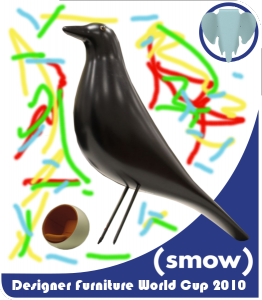
Not only because of the international stature of the two design teams; nor because of the important role that both played in the development of industrial and furniture design in their home nations. The critical interest was much more if – and when yes to what extent – Egon Eiermann’s approach would mirror that of Charles and Ray Eames.
And the opening exchange was to provide for ample controversy.
Charles and Ray Eames opened with their standard DCW plywood chair: a move which provoked an almost instantaneous response from Egon Eiermann in the form of an SE 42. Referee Arthur Mehlstäubler rejecting appeals for a penalty on the basis that the the formal vocabulary available for designing such a plywood chair is limited: so ball to hand and as such no penalty. A decision that was not universally accepted amongst the capacity crowd in Durban.
Undeterred Charles and Ray Eames produced quick fire DSR and DSW sidechairs before taking a deserved 1:0 lead with one of their trademark “Eames Elephants“.
The Eames Elephant however seemed only to spur Egon Eiermann to increase his efforts and, after a little experimentation, Eiermann was able to draw level with his Rattan Chair. Shortly afterwards he moved into a 2:1 lead with his deceptively robust Eiermann deskframe.
And despite some intensive aluminium chair work from Charles and Ray Eames, Egon Eiermann held on for a 2:1 victory.